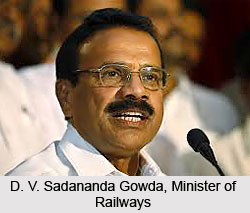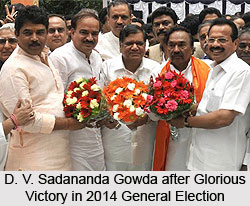 D. V. Sadananda Gowda is an Indian politician hailing from South India. He was the 20th Chief Minister of Karnataka. Now, after the splendid triumph in Indian General Election 2014, conducted by Election Commission of India, he is now serving as the Minister of Railways in the Government of India, under the leadership of Narendra Modi.
D. V. Sadananda Gowda is an Indian politician hailing from South India. He was the 20th Chief Minister of Karnataka. Now, after the splendid triumph in Indian General Election 2014, conducted by Election Commission of India, he is now serving as the Minister of Railways in the Government of India, under the leadership of Narendra Modi.
Early Life of D. V. Sadananda Gowda
Devaragunda Venkappa Sadananda Gowda popularly known as D. V. Sadananda Gowda was born on March 19, 1953 to Venkappa Gowda and Kamala of Mandekolu Village in Sulya taluk in an ethnic Tulu Gowda family, a major ethnic group in some parts of Dakshina Kannada District and Kodagu District (Coorg).
Devaragunda Venkappa Sadananda Gowda graduated in Science from the St. Philomena College, Puttur. After that he went on to obtain his degree in law at Udupi Vaikunta Baliga College of Law. From there he joined in regional politics. He became an active political member in student politics during this period. There he was elected as the General Secretary of the Students Union of the Law College. Subsequently, he became the District General Secretary of the Akhil Bharatiya Vidyarthi Parishad (ABVP). This student union is a right-wing of All-India student organisation working in the field of education. It is the student wing of the Rashtriya Swayamsevak Sangh (RSS). Akhil Bharatiya Vidyarthi Parishad (ABVP) was founded in 1948 and formally registered on 9 July 1949.
D. V. Sadananda Gowda has served in the Co-operative Movement in Karnataka with various aptitudes. He was the Vice President of SCDCC Bank, Mangalore, Director, SKACM Society, Mangalore and the President Sulya PLD Bank, Sulya. He also served as the Director, Central Arecanut and Cocoa Marketing and Processing Co-operative Limited (CAMPCO), Mangalore from 1991 to1994.Later he also served as the President of Mandekolu S.C.Society, Mandekolu, Sullia and as the Member, State PLD Bank Staff Selection Committee in the year 1989-1990.
From the year 1976, Devaragunda Venkappa Sadananda Gowda formally known as D. V. Sadananda Gowda started practicing law at both Sulya and Puttur. He was a public prosecutor for a brief period in Sirsi in Uttara Kannada district. But he resigned his job to concentrate on his political career in regional and national scenario.
Political Career of D. V. Sadananda Gowda
D. V. Sadananda Gowda formally began his political career as a member of the Jan Sangh. He was President of the Sulya Assembly segment of Jana Sangha. After the split of the Bharatiya Janata Party, he became a member of the BJP. Later, D. V. Sadananda Gowda served as the President of Dakshina Kannada BJP Yuva Morcha, then the Vice President of Dakshina Kannada BJP, Secretary of State BJP Yuva Morcha from 1983 to 1988, State BJP Secretary from the year 2003-2004) and then he came in national political spotlight as a National Secretary of Bharatiya Janata Party (2004).

D. V. Sadananda Gowda was elected to the Karnataka Legislative Assembly in 1994 and 1999 from the Puttur Assembly seat in Dakshina Kannada District. He became Deputy Leader of the Opposition in his second term as MLA (Member of Legislative Assembly). He has served with determination and ambition in various committees of the Karanataka State legislature including the Cell for preparing Draft Bill on prohibiting Atrocities on Women, Karnataka, the Committee of Energy, Fuel and Power, and the Committee for Public Undertaking. Later D. V. Sadananda Gowda was nominated as the President of the Public Accounts Committee in 2003.
Sadanada Gowda has also worked for the labour movement being the General Secretary of Bharatiya Mazdoor Sangh of Puttur Division and he also served as the President of Sullia Taluk Auto Rickshaw Drivers and Owners Union.
Rise to Fame
Devaragunda Venkappa Sadananda Gowda was elected to the 14th Lok Sabha in 2004 from the Mangalore Lok Sabha seat. There he defeated Veerappa Moily of the Indian National Congress. In the year 2009, the party shifted him to the Udupi - Chikmagalur constituency.
In the Parliament of India, Devaragunda Venkappa Sadananda Gowda was on the Committee on Science and Technology, Environment and Forests. In the 14th Lok Sabha, he was a member of the Committee on Commerce. Government of India had appointed him as Director of Coffee Board in January 2005.
In the year 2006, Devaragunda Venkappa Sadananda Gowda was chosen as President of BJP in Karnataka. He earned National prominence being the President when BJP won an assembly election for the first time in South India in May 2008. He was elected to the 15th Lok Sabha from Udupi Chikmagalur Constituency before he became the Chief Minister of Karnataka.
Sadananda Gowda was chosen as the Chief Minister of Karnataka in August 2011. He was the second ethnic Tuluva Chief Minister of Karnataka after Veerappa Moily. He was sworn in as the Chief Minister of Karnataka on 4th August, 2011 He earned national prominence as the President of the Karnataka unit of Bharatiya Janata Party when the BJP won an assembly election for the first time in South India in May 2008. As Chief Minister of Karnataka, he strived hard to recover the picture of his party that had been stained due to allegations of corruption. Devaragunda Venkappa Sadananda Gowda introduced various development schemes such as Sakaala, aimed to provide time bound services at government offices. But within a few months of becoming Chief Minister, he fell out with Yeddyurappa and was unable to unite the various factions of the party. After suffering big loss in May 2013 elections, Bharatiya Janata Party elected him as the opposition leader of Legislative Council in Karnataka. On 26 May, 2014, Devaragunda Venkappa Sadananda Gowda was sworn in as the Minister of Railways.
Personal Life of D. V. Sadananda Gowda
Sadananda Gowda is married to Datty Sadananda. They are blessed with a son, Karthik Gowda who is an engineer by profession.






